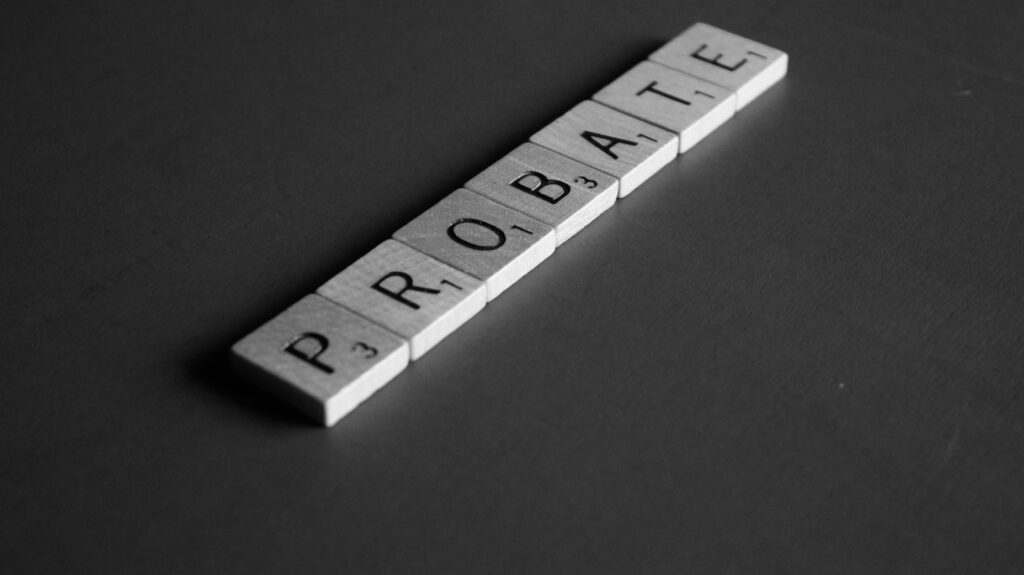Financial affairs to be addressed
- Accessing and Closing Bank and Building Society Accounts
- Outstanding Loans, Debts and Repayment plans
- Mortgages
- Benefits
- Stocks and Shares
- Property
- Pensions
- Insurance – car, house, life policies
- Inheritance Tax
Accessing/Closing Bank and Building Society Accounts
You can inform the bank or building society of a death once you are in receipt of the following documents:
- The official will
- A death certificate
- A grant of probate
A grant of probate is essentially written confirmation that you have the authority to deal with a dead person’s assets and estate. A specific person is appointed as executor of their financial affairs. It can be applied for via a solicitor or you can do this yourself directly. You may have to pay a fee to apply for probate, depending on the value of the estate. If your loved one left no official will, letters of administration will be issued to their next of kin. This entails a similar application process to a grant of probate, although this can be applied for by post. More information about the application process for both can be found on the Gov UK website.
Ideally, a grant of probate should take three to five weeks to be approved. However, this varies according to the circumstances. The process can also be slowed down if you make a mistake on the form.
Without a grant of probate or letters of administration, it can be extremely difficult, if not impossible, to access the bank or building society account of a dead loved one.
There are some instances, however, where these documents might not be required:
- If the deceased person had limited funds in their account – some banks and building societies will release the money without a grant
- The properties, bank or building society accounts were jointly owned by a surviving spouse or civil partner
Individual Accounts versus Joint Accounts
The documents detailed above will be required to formally close an individual current/savings account. It will remain open until these documents are presented and all the money in the account is retrieved. Direct debits and standing orders will be cancelled, however, as will online banking services.
It is important to know that withdrawing money from an open bank account of someone who has died, before you have informed the bank and been granted probate, is against the law. This is even applicable if you need to use the money for funeral payments. That said some banks, such as Lloyds, will grant you access to the bank account of a dead loved one if it is required for urgent expenses (i.e. funeral or probate funds).
It is the responsibility of the executor to withdraw and distribute any money from an individual account according to the will. A solicitor will usually help you with the process. If someone has died without leaving a will, rules of intestacy apply.
The only time it is not illegal to withdraw money from an open bank account of someone who has died is if you are the surviving person named on a joint bank account. In this instance, there is no need to wait for a grant of probate before accessing funds. Most joint accounts come with ‘rights of survivorship’. This means if you shared a bank account with a partner who has died, you, as the survivor can take full ownership of the account. Often, you will need to present the death certificate to your bank and the account will be changed so that it is solely in your name.
The terms of a joint bank account typically override that of the will of the deceased person and the account is not counted as their ‘estate’. Therefore, they cannot leave the money within a joint account to anyone else other than the person they share it with.
Added considerations about bank accounts:
- When a loved one dies it is possible that you do not know the details of all their existing bank accounts. In that case, My Lost Account is a useful tool for discovering these unknown bank accounts.
The Death Notification Service is beneficial for informing several banks about a death with just one form. If your loved one had multiple bank accounts with various institutions, it removes the stress of having to notify each bank individually.
Outstanding Loans, Debts, and Repayment plans
When someone dies, any outstanding debts they had are paid out of their ‘estate’ (money and property they leave behind). Unless you had a joint loan or provided a loan guarantee, you will not automatically inherit the debt of a loved one who has died. Rather, it is the responsibility of the executor of the will to make sure the debt is paid off.
If your loved one was in debt or in the process of making repayments, here is what you should do next:
- Inform creditors that the person has died.
- Ask for a statement from the creditor confirming the outstanding debt amount.
- If you are the executor, pay the debts off in priority order. Naturally, secured debts such as a mortgage should be prioritised first. If you want to keep their property in your name, you will need to undergo a mortgage assessment to confirm you are able to take over mortgage payments. Following this, pay off reasonable funeral payments and the cost of administering the estate. Finally, focus on paying off unsecured debts such as credit cards, utility bills and unpaid rent.
If outstanding debts are too large to be paid off, the biggest asset of the person who has died, which is usually a house may need to be sold. In addition to this, a loved one’s debt can sometimes make it difficult for you to pay your own debts without the support of a second income.
More detailed information on dealing with death and debt can be found on the Money Advice Service website.
Credit Cards
The executor or administrator is responsible for paying debts off from the deceased person’s estate. In the majority of cases, the spouse will not be required to pay off the debt, even as an additional cardholder. Check if your loved one had a payment protection plan. The person who signed the credit agreement is liable for credit debts, including credit cards. Any monies owed can be recovered from their estate.
It is important to note that if there are other authorised users on a credit card, they must stop using the card if the main cardholder dies. In this case, they must apply for new cards.
Hire Purchase agreements
Hire purchase agreements are used to buy household goods and cars in particular. It is important to note that goods do not belong to you until the final payment is made. You may need to return the goods to the creditor if the goods have not been paid for in full. Check to see if your loved one took out an insurance policy that pays off the hire purchase agreement should they die. In this case, the credit agreement can be paid off and the goods become part of the estate.
Mortgages
If the deceased had a mortgage, the executor must pay it off out of the estate. This must be done before anything is passed on to the beneficiaries of the will. However, it is not always straightforward as to what happens to a mortgage and professional help may be required.
Factors affecting mortgage payments:
- Type of mortgage
- Whether there are any surviving borrowers and their relationship to the deceased
- How much is owed
- Whether there is a life insurance policy
If it has been determined during probate that the mortgage cannot be paid, the mortgage lender can recoup the debt by selling the property.
Many mortgage lenders will agree to put the account on hold during probate so beneficiaries do not need to make payments during this period. However, interest may still continue to accrue, even if payments are frozen. If you are in a situation where you have inherited a property and any associated debts, you should seek professional advice during the period of probate. It should be noted that you are not legally obliged to cover the cost of mortgage repayments of an inherited property, but if you do not keep payments up you could lose the property. If you decide to keep the property you have several options including asking for a payment holiday, changing to an interest only mortgage, increasing the term of the mortgage or re-mortgaging.
Joint mortgages
In the case of a joint mortgage, the outcome is very dependent to a large extent on the way the property is owned. With a Joint Tenancy, the surviving mortgage holder will inherit the mortgage debt automatically along with the property. If there is no life insurance pay out, the surviving mortgage holder will have to show that they can continue to pay the mortgage as a sole borrower. The other scenario is Tenants-in-common whereby the ownership rights and responsibility for the mortgage will depend on whether they left a will, and on their wishes for what happens to that share in the event of their death.
If the mortgage was in your partner’s name only, the money will still need to be paid back. If the mortgage holder had mortgage life insurance, this will be used to pay off the remainder of the mortgage. In the case that the mortgage holder had no other life insurance in place or any assets to settle the outstanding mortgage debt, and the surviving partner cannot make the payments, the property will have to be sold to pay off the monies owed. Naturally, the surviving spouse or partner can take out a mortgage in their own name, as long as they are eligible.
If you are uncertain, speak to your mortgage lender or an experienced mortgage broker who can help you to find a solution that works for you.
Benefits
The Department of Work and Pensions (DWP) will check benefits that the deceased person had. This service can also let you know whether next of kin can apply for bereavement benefits or a funeral payment. If the person who has died was claiming benefits, inform the DWP. There is a Tell Us Once service to convey the information. If the deceased person has been overpaid, this means there will be a debt called a benefit overpayment and this will be taken from the estate.
You may be able to claim extra income when someone dies. This includes a bereavement support payment, which is not means tested, but you must meet the eligibility requirements. Often this is paid as a one-off payment followed by 18 monthly payments. This can be claimed by post or telephone by calling 0800 151 2012. Universal Credit may be claimed if you have a drop in income. If you are the only adult now living in your property, you may also be able to claim a 25% discount on your council tax bill.
Stocks and Shares
What happens to the stocks and shares held by someone who has died depends on the provisions they made while alive. If they were married and held joint stocks and shares then their surviving spouse typically becomes the sole owner. However, if stocks and shares were held individually then, ideally, they should have designated a beneficiary in their will.
If you inherit stocks and shares you can choose to keep them or redeem them. Before you can sell stocks and shares left to you, however, ownership must be in your name and not in the deceased.
If you discover an old share certificate amongst your loved one’s belongings and want to know how much it is worth, you can check this by going to the Companies House website. It will give you an address for the company, if it still exists. Next, you should write to the company secretary and ask for the name and address of its registrars who look after a company’s share register. You then need to contact the registrar to make sure you are on the list of shareholders. More information about inheriting stocks and shares can be found on the Saga website.
Property
Timeshares
Timeshares are a contentious issue. They are often considered a financial burden rather than a positive inheritance. Often, they entail yearly maintenance fees and offer little flexibility with regard to the date and destination of your holiday. Some timeshare contracts state the responsibility of payment will be passed on to the next of kin, as opposed to being annulled in the event of death. If your family member has stated in their will that they would like you to inherit their timeshare, you can file a disclaimer and reject the responsibility. Timeshare Solicitor has a helpful resource outlining the next steps.
Pensions
If your loved one was receiving a state pension, you must inform the Pension service so that their payments are stopped. Their helpline number is 0800 731 0469.
If the person that has died was your spouse or civil partner, you might be entitled to extra payments from their state pension. This depends on the amount of national insurance (NI) contributions they made and when you reached the state pension age. To find out if you are eligible, you will need to contact the Pension Service on 0800 731 7898, which is free of charge. If you haven’t yet reached state pension age, you may still be eligible to claim Bereavement benefits.
Equally, it is advisable to check your loved one’s paperwork to see if they were paying in to any private or workplace pension schemes. If they did, contact the pension provider or their employer to find out how much and what to do next. If your loved one was still paying into a pension when they died, the pension provider will probably request a copy of their death certificate. The Money Advice Service offers more detailed information about death and pensions on their website.
Insurance
Most insurance policies terminate on the death of the main policyholder. This means that you may not be protected should anything happen.
Car insurance
It is important to note that car insurance policies often become immediately invalid after the death of the policyholder. If you are the named driver on a vehicle policy, you may not be covered if you drive the vehicle. In this case, you should contact the insurance company to make temporary arrangements. In some cases, you will need to get a new policy, although this does not need to be taken out with the deceased persons insurers.
Most insurance companies will require the following information:
- Details of the deceased
- Vehicle registration number
- Address, postcode and contact number
Home insurance
You must let the insurance company know that a property will be empty if the deceased person lived on their own. Any unoccupied property is more prone to damage due to leaking pipes or storm damage and theft, vandalism and squatters. It is a good idea to remove any valuables that can be carried easily from the property and store them securely. If you take these items to your own home, you may need to let your own insurance company know.
If it is your spouse or partner who has died, the insurance company must be informed that circumstances have changed. The terms of the estate will dictate how much cover you need, so it is good to get a number of quotes.
Most insurance companies will require a copy of the death certificate. However, different insurance companies have different ways as to what happens.
- May extend the homeowners current policy until the expiry date
- May continue to cover the property for 30 days
- Cancel the policy with immediate effect
Some companies arrange specialist probate home insurance whereby cover is provided whilst the property is empty.
Life insurance
This is sometimes referred to as life cover and pays out either a lump sum or regular payments when someone dies. It is aimed at giving financial support to those who were dependent on the deceased person. This could be a spouse, partner or children.
- Term life insurance policies – these are taken out for a fixed amount of time and only pay out if the person dies during the policy.
- Whole-of-life insurance policies – these pay out when the person dies.
When you feel ready, you can contact the insurance company to start making a claim. With a life insurance policy, there is no time limit on claiming. The Association of British Insurers, (ABI) can help you to find out if your loved one had a life insurance policy. You do not need the policy document or know the name of the insurance company that issued the policy. If you know the insurance details, contact the life insurance provider and find out which documents they require. The insurer will need the name of the deceased person, policy number, and a copy of the death certificate. They will also want to know the cause of death, which can be found on the death certificate.
Inheritance Tax
Inheritance tax does not apply if the value of your dead loved one’s estate is below the £325,000 threshold. Also, if the value of their estate is above that amount, but it has been left to their spouse, civil partner, a charity or community amateur sports club, inheritance tax is not applicable.
Even if the estate of your loved one is below the threshold, you will need to report their estate to HMRC. The standard inheritance tax rate is 40% and is only charged on the part of the estate above the threshold. More detailed information can be found on the Gov UK website.
How we can help you with your funeral requirements
We hope the above has been useful for you when it comes to arranging your loved one’s finances after death. Discover more information below about how to organise or close the following, associated accounts when someone has died:
The above is for your guidance only and is not an exhaustive list. Your relationship to the person who has died, such as whether you are married or not, might impact on whether the above advice is applicable to you.
You should always seek legal advice following the death of someone close to you.





